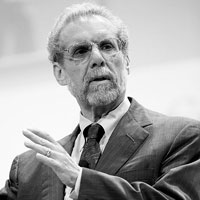The IIRP Graduate School sponsored the December 2020 WOBI (World of Business Ideas) digital event on the theme of emotional intelligence in leadership. Featured speaker Daniel Goleman, Ph.D., who wrote the bestselling book Emotional Intelligence (1995), joined IIRP President John W. Bailie, Ph.D., to discuss why emotional intelligence is more important now than ever, not only for business leaders but all of us.
It was an honor to speak with Dan Goleman. His work on emotional intelligence has been a tremendous influence on my personal practice as a leader. Dan’s thinking has also been foundational to the work of my institution, the IIRP Graduate School — the world’s first graduate school wholly dedicated to the science of relationships and community.
Our world is increasingly complex. The COVID-19 pandemic, political unrest, and economic realignment are all accelerating the pace of change. (Text continues below.)
Dan’s work on emotional intelligence has focused on an aspect of human relationships that is timeless. Today’s business context certainly demands not only a “nice to have.” Emotional intelligence in leadership and in organizational culture increases loyalty, retention, and commitment. As Dan said, “If you value the long-term sustainability of your own organization, you will consider, ‘How can we make this a more emotionally intelligent workplace?’”
Emotional intelligence can be purposely learned and improved upon. It can be tempting to let ourselves “off the hook” as leaders by thinking that some people are just born more emotionally intelligent than others. However, this is an area that leaders can deliberately commit to improving. Unlike IQ or other accidents of birth, “EQ” is that leaders embrace change and nimbleness. Paradoxically, this is best accomplished when we also recommit ourselves to the development of those aspects of leadership that are foundational and have always been true.
Effective leadership begins with the leadership of one’s self. Business leaders are being called to manage their own reactions to incredible uncertainty. Add to this the complexity of communicating and relating effectively via virtual engagement and, as Dan says, the development of emotional intelligence and self-awareness is even more important today than fifty or even one hundred years ago.
An organizational commitment to cultivating emotional intelligence should be a top priority, learned in life and wide open to improvement for every individual. All that’s required is the desire to do so and competent coaches and mentors who can help.
Finally, for our diverse group of business leaders from around the world, Dan says, “Emotional intelligence matters the same wherever you are — whatever you do. It’s all about people and how well you can guide them and get them to want to give their best.”


